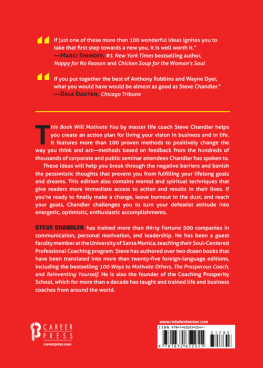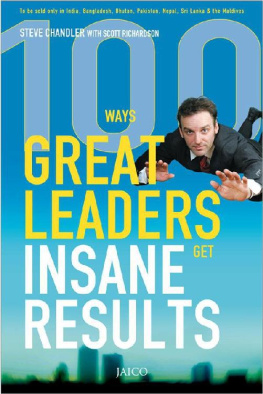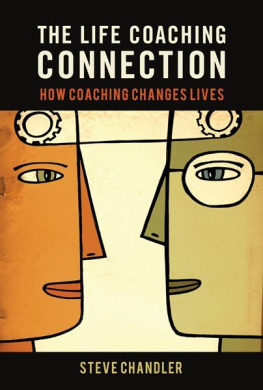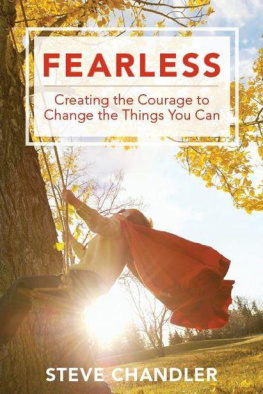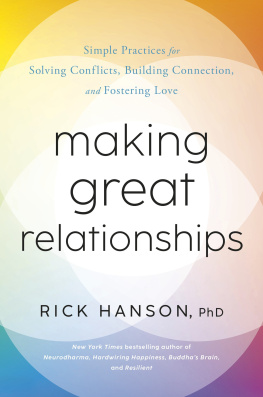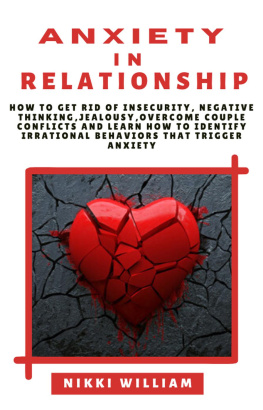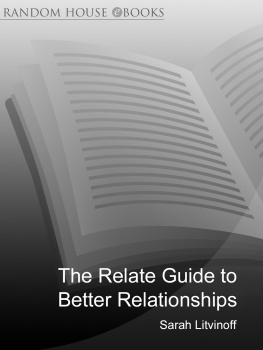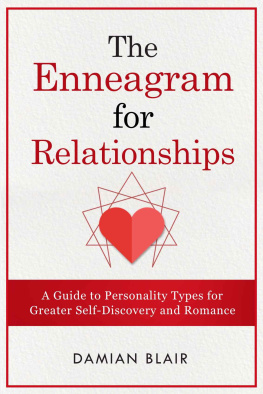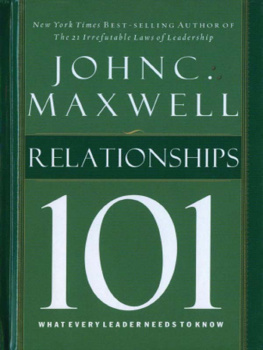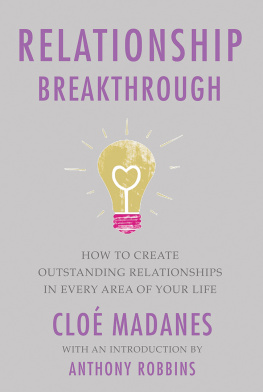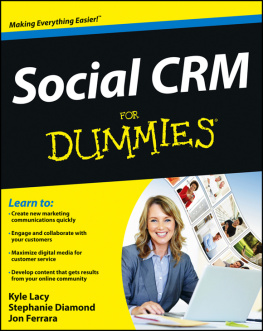Table of Contents
50 Ways to Create Great Relationships
Copyright 2000, 2004, 2017 by Steve Chandler
All rights reserved. No part of this book may be reproduced or copied in any form without written permission from the publisher.
Maurice Bassett
P.O. Box 839
Anna Maria, FL 34216
Contact the publisher:
MauriceBassett@gmail.com
www.MauriceBassett.com
Contact the author:
www.SteveChandler.com
Cover design by Colleen Raney
Interior layout by Chris Nelson
ISBN: 978-1-60025-104-7
Library of Congress Control Number: 2017901215
To Kathy
Acknowledgments
I want to thank: Steve Hardison for teaching me everything I know that led to everything I wrote in this book; Lyndon Duke for consultation on making a difference; Fred Knipe for all the many transformative suggestions; Kathryn Eimers for the elements of sense and style; Bob Croft for producing an audience; Nathaniel Branden for the psychology; Colin Wilson for the philosophy; Lindsay Brady for the gift of perception; Darlene Brady for the business sense; Jim Brannigan for the representation; Ron Fry for Career Press; Stacey A. Farkas for the expert editing; Leah Be for introducing me to Lyndon; Scott Richardson for the ongoing ideas and encouragement; Dennis Deaton for playing Martin to my Lewis on the road; Dale Dauten for the great columns and friendship; Michael Bassoff for the relation-shift; Terry Hill for the letters from France; Bill Eimers for making the introduction of the century; Stephanie Chandler for working the Net; John Shade for the best poem ever written; and Spider Hole for the music.
And last but not least, a tremendous acknowledgment to my dear Dr. Merlin F. Ludiker for the gift of humor. (Ludiker, like Quixote or Pickwick, ventures into fields he does not belong in. And his innocence and enthusiasm for faking his way in are characteristic of an inverse heroism that causes us to laugh for joy. His attempts to look good are absurd, and his attempts to cover his tracks elegantly reveal the foolishness of our own lives wasted by trying to live up to other peoples expectations.)
We will now discuss in a little more
detail the Struggle for Existence.
~ Charles Darwin
The Origin of Species
Introduction
How to Handle a Woman
I remember as a boy going to New York City to see the Broadway musical Camelot, and I remember Richard Burton singing a song about the wisdom he, as King Arthur, had received from Merlin, his wizard.
The song, by Rodgers and Hammerstein, was called How to Handle a Woman. As a teenage boy I had more than a passing interest in the subject, and I was spellbound by the quiet, dramatic ballad. I remember the song ending with the king singing that the way to handle a woman was to love her. Simply love her. Merely love her. I was young but I remember that the formula sounded simple enough, and I dont know why I didnt just adopt it right then and there for all relationships in life, because it would have saved me a lot of unnecessary trouble.
It took me many years after seeing that play to get that formula back, but when I did, powerful things began to happen.
As I grew older and began to make my living teaching seminars, I realized that almost all of us forget to use this effective process. We end up having difficulty in even the simplest relationships because we do not use it.
For how to handle a woman is also how to handle a teenage son and how to handle a customer and how to handle a business partner and, finally, how to handle any relationship.
But where we often seem to go wrong is in misunderstanding the mechanics of love itself. Because we associate love with feelings and because we associate the absence of love with feelings, we turn the whole idea of relationships into a feelings thing. Even (and especially) in the workplace. And that is our first mistake.
Because love is not a feeling. Love is a creation, and, therefore, love comes from the spirit. It comes from the highest part of every human being and it asks that we access our greatest powers of imagination. As writer Emmet Fox says, Love is always creative and fear is always destructive.
Recently I received a letter from a man in Japan who had purchased audio tapes of a relationship seminar Id given years ago. One particular image intrigued him:
Boy, I loved it when you used the dead fish as an example. Its so true! All a dead fish can do is react. If you put a dead fish in the stream it just reacts to everything, every rock, every branch, every flow of water. Dead things react. Like you said: Live fish dont react, they create. They create a path through the water or stream depending on where they want to go. Thats so great. Reacting is done by dead things. If we just react to other people all day we...are dead already. Were a dead thing responding to the life of the other person.
The solution to the problem is so easy and gentle: You can change everything when you make it your gentle practice to create rather than react.
The 50 ways to create relationships all come from my workshops and seminars on the same subject. These are easy thinking tools that have worked well for average people like me. Through the process of trial and error I have saved the 50 mental concepts that work the fastest and easiest and put them in this book.
Each of these thinking tools asks us to be creative just a little beyond the norm. Each one requires a certain awakening of the artist that lives in all of us. But to awaken that artist within is to learn how to feel joy againin business and in life.
Useful though pessimism is,
it cant cover it all.
~ Tibor Fischer
The Thought Gang
Chapter 1
Use the Element of Surprise
Experiments never fail.
~ Dale Dauten
The Max Strategy
T he element of surprise is a notorious military strategic advantage, and its an even greater advantage in relationships.
Think back throughout your life. What are the best gifts you have ever gotten? What do they have in common?
Some people guess that its the gift of time, or the gift of something handmade, or the gift of compassion, the gift of listening, the gift of service; the guessing goes on. But many people rarely see itthe best kind of gift anyone ever gets is the unexpected gift, the one they never dreamed theyd get.
Theres nothing better in life than a pleasant surprise. I remember G. K. Chestertons characterization of a spiritual experience as the one in which you get an unexpected feeling of absurd good news.
When cancer research fund-raiser Mike Bassoff began to realize this, he instituted a program with his staff called Innovative Thank yous. He realized that an expected thank you was practically worthless to his cause, because it is instantly forgotten. But a thank you that was unexpected would be remembered forever. So his team constantly experimented with thanking people in ways they didnt expect.
Mrs. Harvey Johnson lived in Omaha, Neb., and had lost her son a number of years prior to lymphoma. She was terribly depressed at the time as only someone who has lost a child can understand. Years later, she told the story of her sons death to Michael Bassoff, and he listened. Soon after the conversation, she donated $50,000, which was used to buy new laboratory equipment for doctors experimenting in lymphoma research. A year later, those same doctors had achieved a breakthrough in experiments they were doing on the blood of lymphoma patients.
Whereas most fundraisers would have given Mrs. Johnson a pen and pencil set or a wall plaque to thank her for her donation, Bassoff arranged for her name to get prominent mention in an article in the obscure hematology journal,


